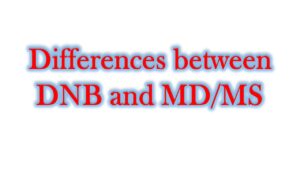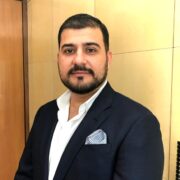
What is the Difference Between DNB and MD/MS?

When considering a postgraduate medical degree, aspiring doctors often face the choice between DNB (Diplomate of National Board) and MD/MS (Doctor of Medicine/Master of Surgery). Both are prestigious qualifications, but they come with distinct differences in terms of recognition, training environments, admission processes, and career prospects. Here’s a detailed breakdown to help you understand their key differences:
- Overview and Recognition
- DNB (Diplomate of National Board) is awarded by the National Board of Examinations (NBE) and is recognized by the Medical Council of India (MCI), but there may be recognition issues in some states and institutions. It is typically awarded after training in accredited hospitals across India.
- MD/MS (Doctor of Medicine/Master of Surgery) are postgraduate degrees awarded by medical colleges and universities. These qualifications are generally recognized and widely accepted across India and internationally.
- Training Environment
- DNB: Training is conducted in accredited hospitals and institutions, offering broad exposure in a real-world clinical setting.
- MD/MS: These programs are generally conducted in medical colleges or teaching hospitals, which may provide more structured academic and research-focused environments.
- Duration
Both DNB and MD/MS courses typically have a duration of three years.
- Admission Process
- DNB:
- Requires clearing the NEET-PG entrance exam.
- Admission is centralized and managed by the National Board of Examinations (NBE).
- Seat allotment takes place based on NEET-PG rank through counseling.
- MD/MS:
- Also requires clearing the NEET-PG exam.
- Admission is managed by the Medical Counseling Committee (MCC) for the All India Quota and state authorities for the state quota.
- Seat allocation is divided into All India Quota (50%) and State Quota (50%).
- Eligibility Criteria
For both DNB and MD/MS, candidates must:
- Hold an MBBS degree.
- Complete a rotating internship.
- Qualify the NEET-PG exam.
There is no upper age limit for either qualification.
- Career Prospects
- DNB:
- Gaining acceptance in hospitals and academia is increasing, especially in multi-specialty hospitals and private practice.
- Recognition issues may still exist in some regions, but these are reducing over time. It is equally respected in private practice and is internationally recognized.
- MD/MS:
- Widely accepted and considered prestigious in hospitals, academia, and research.
- Particularly preferred for teaching roles in medical colleges.
- Offers excellent career opportunities in both clinical practice and academia.
- Fees Structure
- DNB: Fees vary based on the hospital type but typically range from ₹1,25,000 to ₹2,75,000 per year, with a total cost of ₹2,50,000 to ₹8,25,000 for the entire program.
- MD/MS:
- Government Colleges: Annual fees range from ₹10,000 to ₹70,000, with a total cost ranging from ₹30,000 to ₹2,10,000 for the 3 years.
- Private Colleges: Fees are higher, ranging from ₹3,00,000 to ₹25,00,000 annually, with total costs between ₹9,00,000 and ₹75,00,000.
- Challenges
- DNB:
- Limited seats, making the admission process highly competitive.
- Some institutions and regions may still show a preference for MD/MS over DNB.
- MD/MS:
- Highly competitive due to limited seats, especially in top government colleges.
- Can be more expensive, particularly in private institutions.
- Global Recognition
- Both DNB and MD/MS are recognized globally, but DNB holders may need additional certifications for certain countries, while MD/MS holders may already meet some international requirements.
- Research and Academic Opportunities
- DNB: While it offers excellent clinical exposure, it has fewer opportunities for structured research compared to MD/MS.
- MD/MS: Research opportunities are generally more accessible, particularly in academic institutions, and provide a stronger foundation for a career in medical academia.
Summary of Key Differences:
| Feature | DNB | MD/MS |
| Awarding Body | National Board of Examinations (NBE) | Medical Colleges and Universities |
| Training Environment | Accredited hospitals | Medical colleges and teaching hospitals |
| Recognition | Increasing, but may face regional bias | Widely accepted and prestigious |
| Admission Process | NBE conducts centralized counseling | State and central counseling (MCC) |
| Career Prospects | Strong in hospitals and private practice | Widely accepted, strong in hospitals and academia |
| Duration | 3 years | 3 years |
| Fees | ₹1,25,000–₹2,75,000 per year | Government: ₹10,000–₹70,000, Private: ₹3,00,000–₹25,00,000 per year |
Conclusion:
- DNB offers valuable clinical experience and is increasingly recognized, particularly in hospitals and private practice, but may face some regional recognition issues.
- MD/MS offers prestigious academic and clinical opportunities, with widespread acceptance in both government and private sectors, particularly in teaching roles and research.
Choosing between DNB and MD/MS should be based on your personal preferences regarding training environments, career goals, and financial considerations.
SETTLE ABROAD
Skilled Immigration
Study and Settle Abroad
How to find your first job in Canada
Top 7 colleges in Melbourne Australia
MBBS ABROAD
Medical Admissions
- MBBS Abroad
- MBBS in China
- MBBS in Georgia
- MBBS in Kazakhstan
- MBBS in Kyrgyzstan
- MBBS in Philippines
- MBBS in Ukraine
- MBBS in Russia
- MBBS in Armenia
- MBBS in Belarus
- MBBS in Nepal
- MBBS in Bangladesh



